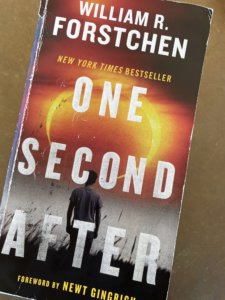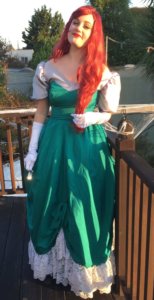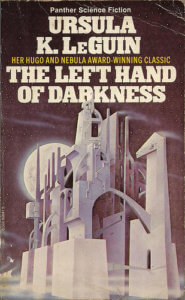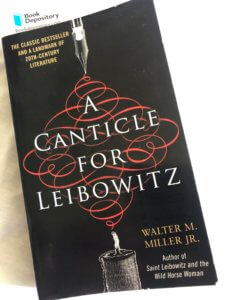For Educators
STATION ELEVEN, A No-Spoiler Review
Last week, a few members of my family watched all ten episodes of STATION ELEVEN. This HBO Max miniseries is based on a novel by Canadian author, Emily St. John Mandel.
As a dystopian story, this series pleased all of us, different generations and genders. I rate it PG or PG13. The topic is challenging, but the people in STATION ELEVEN are not vile or overly violent…not much gore or explicit sexual content to worry parents…however, the subject matter is sophisticated, a web of relationships. It’s family-friendly with mature teens and if your kid is a drama-geek, they will LOVE this show.
First, My Short Review: 6 Reasons I recommend STATION ELEVEN
- The storyteller uses a familiar trope, a world destroyed by a deadly and contagious flu, but delivers an unexpected cast of characters, as well as a post apocalyptic vision of hope
- The angle on “life-after-the-fall-of-civilization” captures something both historic and literary in how human beings find meaning in the broken world they inhabit
- The characters shine and fail, change and surprise
- A fun cast as ethnically diverse as it comes, and without stereotyping
- The city of Chicago or the wilds around Lake Michigan are featured in just about every episode…and that felt refreshing. Granted, I now live in the Upper Midwest, but new settings other than NY and LA are a welcome television treat
- STATION ELEVEN is self contained as a miniseries. Watch all 10 episodes and you have a complete experience…I like that.
The Longer Review
STATION ELEVEN, the miniseries, is based on a novel I have not read. One scifi-reader friend told me he found that novel difficult to “get into” as a book. He felt impatient with it, complaining how it took too long to get to the dystopian world scenario. He was bored by all of the setup and character development that took place before the prime action. That feedback makes me curious to read the novel and then analyze how Peter Sommerville’s screenplay adaptation made adjustments because I did not feel this while watching STATION ELEVEN. The first episode features the unraveling of the world and the tensions inherent in societal breakdown. It focuses on two main characters: Kirsten and Jeeven, a young actress and the man who winds up becoming her caretaker. The subsequent episodes put forward backstory that help build the world and the complex web of relationships. But…I cannot say that the initial story in episode 1 bored me in any way.
Following a traumatic event at a Chicago theater performance of King Lear, Jeeven (an audience member at the theater) is warned by his sister, a doctor on the front lines of the flu pandemic, to get to a market, buy food and make his way to their brother’s high rise apartment. Kirsten, who is a young actress in the play, tags along with him. Jeeven tries to take her home but is unable to locate her parents, so he takes her with him to a market and buys six grocery carts full of food. Together, they push those carts to Frank’s apartment complex, load them on the utility elevator and end up safe with Frank (for a while) as the rest of society crumbles around them. Technology fails, little by little, including their electricity. There is little contact with the outside world. Kirsten entertains herself by disappearing into the world of a graphic novel called Station Eleven. She begins to write a play based on the novel…a book written by Miranda Carroll (Danielle Deadwyler) the ex-wife of Kirsten’s acting mentor, Arthur Leander (played by Gael García Bernal). Leander is a key character in the threads of this story, despite the fact that he is one who collapses and dies on stage while playing Lear in the first minutes of the series.
Jeeven, Frank and Kirsten do not fall to the flu. They stay safe and relatively well-fed in the apartment despite freezing temperatures. However, their haven doesn’t last forever and eventually, the author exploits this trope; the survivors must leave their haven and brave the outside world.
In this next section of the story, Kirsten finds her way to a shakespearean acting troupe. They become her new family. The drama troupe travels around Lake Michigan in the warmer months, performing among other plays, Hamlet. This is one of the surprising twists in the post-pandemic dystopia, to put forward the idea that the arts will continue and be celebrated by many despite how raw life has become for survivors. You will have to watch to find out what happens to Jeeven and Frank. The two brothers are wonderful characters…memorable and complicated.
There is another storyline that enters the series at this point, still somewhat connected relationally and geographically. It’s a surprise, but not an unwelcome one and adds to much of the backstory. Still, the audience does not know how this new storyline will connect to Kirsten’s. It does and it did not disappoint me.
What is woven through STATION ELEVEN is how the connective tissue of our friendships and relationships emerge even in a time of trauma and loss. The storyteller takes us to a place that might seem contrived, yet captures a potential truth, reminding the audience that connections matter and that the truths underlying relationships, like those put on the stage by William Shakespeare, are universal and relevant (especially relevant) to the human experience post pandemic.
ALL SYSTEMS RED, by Martha Wells, A No-Spoiler Review of the first novella in the Murderbot Diaries Series

ALL SYSTEMS RED is a story, entertaining and well-written, that one can read in about 4 hours. Rated PG-13 for adult themes. I read this novella on a flight from Minneapolis to Seattle. I flew on Delta and none of the airline’s tv/film options seemed very thrilling to me. I often try to see HBO or Showtime options when on a flight because I don’t subscribe to either of those services in real life. Thank goodness I had taken this book with me, hardback, but thin, lightweight and easy to pack because it’s only 127 pages.
And now, for my Short, No-Spoiler Review
I highly recommend ALL SYSTEMS RED for these 5 reasons.
- Original voice…the narrator has the appeal of an innocent, he/she is like a child, yet holds the capacity to narrate a futuristic society inhabited by humans and AI living and working together
- Genre bending…science fiction merged with mystery…in other words, a page-turner
- Thought-provoking ideas about AI and how future humans might understand morality/humanity in regards to AI
- Interesting world-building and a great set-up for subsequent stories
- ALL SYSTEMS RED would make a great audiobook. See the longer review for more
Longer Review:
Martha Wells has created a fascinating universe of humanity working and living off Earth, in space, in places that can only be reached via light-speed travel. She doesn’t fixate on the physics of the issue (regarding traveling across vast distances) but focuses on the gritty work life of humans and their bots. In the author’s futuristic world, full AI exist as sex workers and security units (SecUnits) and other helps in life. Also, some humans adopt robotic parts (augmented humans). So, there is a mix of how humans have integrated with tech and within the story world, there is little “judgment” about these realities.
While this is all true, the AI mind that narrates this story has a judgment about itself and humans. The view is not completely skewed toward disgust for humans, though there is some leaning in this direction. Granted, I’ve only read the first 1.5 novellas. But what works in the narrative is that Wells has put forward a more dispassionate, yet charming view of the world the way it is. I highly recommend these novellas as entertainment and am slowly discovering how they speak into deeper moral questions around humanity’s race toward the future, a future in which robots and artificial intelligence will be embedded. These books might appeal to the YA reader because the narrator is endearing and “young” feeling. The value in their education would be the discussion around tech and humanity’s future.
Regarding the narrator. The voice is absolutely charming. I did not listen to the book, but can imagine the voice. This book would be a pleasure to listen to.
To buy the first book, click on All Systems Red
Four of the series in hardback can be bought together. Click on Murderbot Diaries
For the least expensive version to try out novella #1, click on Kindle version: All Systems Red
For the audio version of novella #1, click on Audio of All Systems Red
DUNE Part 1, The film. A No-Spoiler Review

In a similar way that Peter Jackson pleased both the non-reading audience and the hyper fan of the LOTR books, it looks like Villeneuve will do the same for the his audience and fans of the novel, DUNE.
DUNE, the film, is the first of two. It’s only about half of the novel (yet another reason to entice your teen to read the novel), and there could be more films if Villeneuve decides to continue with the novel’s sequels. We’ll see how that goes. The later books are brilliant but probably more challenging for the average audience member to consume. Herbert’s world is a complex and mostly unhappy place on almost all counts.
First, The Short Review of DUNE
5 Reasons to See this Film, Especially if you are a Scifi Fan…
- Mostly pitch perfect and accurate (close to the novel) storytelling
- Herbert’s DUNE is a foundational work in the scifi genre and has a huge international following. AKA, without DUNE, Star Wars might never have been made.
- A vision within the story that transcends culture and era
- Great casting
- An epic visual feast
Now, for the Longer Review…
If you want to go deep, super deep on DUNE, there are papers written, blog posts and articles that speak to why the story DUNE is one that has reverberated in many cultures, especially subjugated cultures, since it was released in 1965. This article is a good one, in case you want more breadth about the history. Click on the link for the Guardian’s penetrating reflection. DUNE article, Guardian.

True, the viewer is only getting a third of the character depth in the film version and for that reason, I encourage all to read (or re-read) the novel. It ages well. But, even if you don’t read the novel, Paul, Leto, Jessica, Duncan, Kynes and the Fremen come across very close to the novelist’s vision. I had two observations of change that caught my attention: Villeneuve did not portray the Atreides’ mostly male in-house staff accurately in terms of their suspicion of Jessica as the betrayer. Their suspicion of the one woman in the mix comes through in the novel, not in the film. Also, the gay Baron Harkonnen is a known child predator in the novel. I can guess there are many reasons Villeneuve decided to forgo this portrayal of the only gay character in the story world. Let him be obese and disgusting in the visuals, but diminish his child predator persona. That seems like a wise decision on many fronts.
The portrayals I loved:
Arakkis, the worms, the Fremen, the sitch, the general feeling of the Bene Gesserit, the Harkonnens, the Sardaukar, the ornithopters, Arrakeen, the costumes (including the stillsuit)…these are all perfect, as are the actors’ portrayals of their characters.
Overall, DUNE was worth the money. I highly recommend this film.
ONE SECOND AFTER, A No-Spoiler Review of the Novel, by William R. Forstchen
My son handed me this paperback during the pandemic. Here, Mom. I think you’d like this book. I read at night before bed. This book gave me nightmares. If you have a teen who loves dystopian fiction he/she might like the book. The main character is a man, but there are young people who play prominent roles as society unravels.
For educators, this book is a fascinating study of civilization as the US is attacked and falls apart. It has potential to lead to fruitful conversations about the US constitution. We often take for granted aspects of our rights, but rights are not easily preserved when society unravels. They are hard to maintain and ensure and leaders make hard choices to reward those who live by the law, and hard choices to punish those who reject it. All that is in this book in a stark way. Great discussion fodder.
I did like this novel, mostly. Here are 5 Reason I recommend ONE SECOND AFTER
- Decent storytelling and an interesting unique setting
- A thoughtful and action-oriented main character, mostly well-written, though the story is so male-centric, I cringed here and there
- A frightening premise that a few “experts” have warned is a real-world possibility
- Page-turning tension
- This book caused me to reflect on how our quality of life/health depends on meds and how rights we assume are dependent on civilization upholding those rights by manner of the law
To buy this novel, click on One Second After
And now for my longer review…
ONE SECOND AFTER, rated PG for some violence, is the story of a mountain community outside of Asheville, North Carolina post EMP attack. In this story, multiple electromagnetic pulse weapons are discharged in the atmosphere above the US, frying all electronics/microchips, etc. Thousands of planes crash, including Air Force 1, killing the president and his entourage…cars stop working (except for the older ones that have no electronic parts) and all modern forms of communication break down, including radio. Add to that no computers, no cell coverage, no refrigeration, no transportation, no heat or cooling, and you put most of the population on a quick path to discomfort, starvation, disease and lawlessness. This story is The Walking Dead, but without the zombies (unless you put desperate people willing to eat human flesh to survive in the same category as zombies).
I did watch most of the The Walking Dead and it became clear after a few seasons that the zombies were not the ones keeping humanity from becoming civilized again, it was regular “alive” people with education and supposed morality who were often the worst perpetrators of horrors. This novel follows the same vein.
The characters I found most interesting were those who tried to lead the group with some semblance of morality and decency. Sometimes, those characters felt a little contrived, but most of the time, I believed they could exist in the real world and appreciated how they were tempted regularly to abandon the Constitution, rights, and a sense of justice. Running a mini-dictatorship made more sense than all the work involved in self-governing, yet they persisted.
One poignant reality in the novel world is that because all trade has come to a standstill, there are no new meds to “take care of” human problems. Everything from a small cut, to heart disease, rotting teeth and diabetes have the potential to be a death sentence. Eventually, mental health is also a part of the discussion when the town elders realize that they might have to imprison or restrain those who might endure psychotic breaks from reality. So many people die in this story, but most die from either starvation or from lack of medicine. An interesting reality to ponder.
FOUNDATION, A No Spoiler Reveiw of the first 2 Episodes

Why unthinkable? The Foundation Series, which began as a few short stories, but over the course of Asimov’s life, evolved into something much more vast, portraying the slow downward spiral of an empire in a sprawling universe over many centuries.
Apple, having bought the rights to the Foundation Series in 2019, invested a large sum to make this happen. The story is definitely being tweaked by Goyer and Friedman, but I am appreciating the adjustments because the Foundation Series novels did not appeal to me. Too many supposedly smart dudes sitting in rooms and talking at one another. Too many ideas delivered in a way that felt preachy to me, therefore dull. Characters that felt interchangeable and almost zero females.
But how about the series? So far I am loving what is evolving on screen. If you’re a scifi fan, here’s why I think it’s worth watching.
- The core of Asimov’s ideas are all there, the story well told so far
- The production design, the sets and costumes are fabulous
- The acting has been surprisingly good
- The screenwriters have changed some of the male characters to female, including Gaal Dornick, the lead character in these first 2 episodes. Dornick, pictured below, is played by Spanish actor, Lou Llobell.

For educators, the idea of eternal rule (by cloning) raises interesting ethical questions, like: How will science and technology impact the governing of humanity?
The third episode drops this Friday, October 1st.
WIDOWLAND A No Spoiler Review of the Novel
Five Reasons I recommend WIDOWLAND, by C.J. Carey
- Excellent pacing and page-turning tension
- A young female hero who comes into her agency in a believable way
- Legit world-building of a bleak UK governed by Nazis
- The writing around the sexual relationships feels vital and true (more on this in the longer review)
- Given the consistent point of view and straightforward timeline, I’m guessing this would make a great audiobook
To purchase WIDOWLAND, click here
The Longer Review…
To control the past, they edited history. To control the future, they edited literature.
WIDOWLAND is an alternative history novel, set in London, 1953. This story would probably carry a PG-13 rating because of the sexual relationships although none of the sex scenes were explicit. For this reason, I wavered on the rating. Overall, the main sex scene was tastefully, even beautifully handled in terms of the emotional weight it carries within the story. Mature teens could handle this book. In fact, it might appeal to many female YA readers because the protagonist is a woman in her twenties.
For educators, WIDOWLAND provides a unique picture of what a society imagined by the Nazis might look like and feel like. Great fodder for discussion. Moveover, it portrays (accurately so) literature as a disrupter of those who broker power.
In this alternative history, Germany has invaded the UK and Hitler rules over it as a protectorate. The coronation of Edward the VIII (Queen Elizabeth’s uncle) and the American divorcee, Queen Wallis, is taking place soon. Significant because The Leader, Hitler himself will descend on London for the celebration. The soon-to-be King and Queen of England are collaborators with the Nazis, based on an actual historical and private meeting that took place between the Edward and Hitler at the Berghof in 1937. (No record of the meeting has survived).
The story, told in close third person by the main character, Rose Ransom, opens with a description of London preparing for the coronation. Through Rose’s eyes, the world unfolds. The reader quickly understands, that although Rose holds little power in the system, she sits at the top of the subjugated population as a Geli. She is young and her view of reality is sometimes naive and not always reliable, but the discoveries she makes along the way are a part of how Carey maintains tension in the story. The reader senses the danger she does not.
This is a story about a woman and about women living under Nazi occupation. Carey could have gone overboard painting the world, but deftly focuses the reader’s attention on the kind of oppression that exists in England for the vulnerable. The elderly, women and widows in particular, suffer under the yoke of the Nazis. She highlights the caste system which categorizes the “utility” of women. In this early excerpt, the reader begins to understand Carey’s 1953 London.
Members of the first and elite caste were popularly called Gelis after the woman most loved by the Leader, his niece Geli. Klaras–after the Leader’s mother–were fertile women who had produced, ideally, four or more children. Lenis were professional women, such as office workers and actresses, after Leni Riefenstahl, the regime’s chief film director. Paulas, names after the Leader’s sister, were in the caring professions, teachers and nurses, whereas Magdas were lowly shop and factory employees and Gretls did the grunt work as kitchen and domestic staff. There was a range of other designations–for nuns, disabled mothers and midwives–but right at the bottom of the hierarchy came the category called Friedas. It was a diminutive of the nickname Friedhöfefrauen–cemetary women. These were the widows and spinsters of over fifty who had no children, no reproductive purpose, and who did not serve a man.
There was nothing lower than that.
Rose first runs into trouble when the Cultural Commissioner of the UK Protectorate asks that she help him solve a mystery. She is to venture into Widowland and spy on a group of Friedas. An uprising is bubbling to the surface in London right as Hitler is set to arrive. These disempowered women are the suspected Nazi resisters. The clock is ticking and Rose’s big boss makes known to her that more than just her job is on the line if she fails.
What unfolds is a story of discovery for Rose and choices that will impact many.
One comment about the sexual relationships in this novel. The sex is not explicit. There is an implied disorder to the relationship between Rose and her lover, who is twenty-five years her senior. The power dynamics and how German men use power to procure beautiful young women is a part of the world these characters inhabit and is taken for granted in the novel world. However, the author adds a scene that is emblematic of sex within a loving relationship. The revelation that comes to Rose and the writing around this encounter are so poignant and beautiful, I will remember this passage of writing for a long time.
THE HOBBIT, Chapter 1…A Study on Craft

For educators: This post and others like it are appropriate for a student who wants to improve in storytelling and/or writing stories. However, most of my writing posts contain spoilers. I recommend the student read the book first.
This is my second installment on first chapters. A few days ago, I analyzed chapter 1 of DUNE. To read that post, click here. Today, I analyze chapter 1 of THE HOBBIT.
This first chapter
–introduces the reader to the world and the main characters
–evokes reader empathy for Bilbo by showing Bilbo’s inner conflict
–presents the choice that will change Bilbo’s life forever
–introduces the reader to the fantastical possibilities that lie ahead, but also the dangers
In a hole in the ground there lived a hobbit. Not a nasty, dirty wet hole, filled with the ends of worms and an oozy smell, nor yet a dry, bare, sandy hole with nothing in it to sit down on or to eat: it was a hobbit-hole, and that means comfort.
Thus begins THE HOBBIT, by J.R.R. Tolkien, but really this sentence begins the longer saga that so many have come to know and love, THE LORD OF THE RINGS. Notice what it accomplishes.
- Sentence #1 introduces a new creature, the hobbit. This creature will inhabit the long saga. Bilbo first will be the unlikely hero (later his nephew, Frodo takes over the hero’s mantle). The audience will come to admire, adore and identify with Bilbo and Frodo.
- This sentence begins to describe the culture of hobbits. They are earthy, living in holes, but absolutely committed to cleanliness and comfort. These creatures are civilized…they just happen to like holes as their place of abode.
- In this first sentence, Tolkien begins to evoke our empathy for Bilbo, who will soon trade in his life of comfort for a wild and magical adventure.
Paragraph #2 of THE HOBBIT describes Bilbo’s home in detail, which will be the place where all the action takes place in the remainder of the chapter, including the entertaining of a wizard and a large group of dwarves, but even more than that, this home represents the comfortable life of a gentleman. Later in the story, Bilbo often longs for home (as does Frodo in the LOtR saga) as a place of rest, comfort and peace. It is a place to return to.
Paragraph #3 and #4 describe Bilbo’s ancestry, posing the curious conflict he bears within himself. There is a debate between the Baggins and the Took within Bilbo. The Took side of his family (Bilbo’s mother’s side) is prone to adventure and risk-taking. The Baggins side of the family (Bilbo’s father’s side) is conservative and would reject adventure and any controversy at all. The reader doesn’t have to wonder for very long which side will win out. Without that Tookish spirit, Bilbo might never have walked away from his comfortable hobbit hole.
Both impulses inhabit Bilbo and most readers can relate. It might be said that opposing impulses, such as what Bilbo experiences, are a part of every person. Thus, Tolkien evokes our empathy for Bilbo in chapter 1. Much as Bilbo leaves the comfort of his hobbit hole to journey with the dwarves, the reader leaves his/her comfort to embark with them in the story world.
Now for the rest of chapter one: Bilbo, because he values hospitality, entertains Gandalf (a wizard who believes Bilbo will be a key member of the adventure) and a group of dwarves who demand food, drink, then compel him to travel with them to a place where a dragon guards a great treasure. The adventure, as it is presented, is magnificent, romantic and promises great wealth. Bilbo is taken in, though it is touch and go for a while whether or not he can bring himself to leave his Hobbit hole. Despite his willingness to leave his home, it could be said the hobbit is in a way bewitched by the romantic notion of a grand adventure.
As they sang the hobbit felt the love of beautiful things made by hands and by cunning and by magic moving through him, a fierce and jealous love, the desire of the hearts of dwarves. Then something Tookish woke up inside him, and he wished to go and see the great mountains, and hear the pine-trees and the waterfalls, and explore the caves, and wear a sword instead of a walking-stick.
Yet, Thorin, the lead dwarf, does not mince words about the dangers they might face.
We shall soon before the break of day start on our long journey, a journey from which some of us, or perhaps all of us (except our friend and counsellor, the ingenious wizard Gandalf) may never return. It is a solemn moment.
What is Bilbo’s reaction to this sobering news?
Poor Bilbo couldn’t bear it any longer. At may never return he began to feel a shriek coming up inside, and very soon it burst out like the whistle of an engine coming out of a tunnel. All the dwarves sprang up, knocking over the table.
The stage has been set. The semi-cowardly and ill-prepared Bilbo Baggins will reluctantly leave his comfortable hobbit hole and venture with these new friends, the dwarves and Gandalf. When he finally returns, he will be completely changed and so will Middle Earth.
For over the misty mountains cold
To dungeons deep and caverns old
We must away ere break of day
To find our long-forgotten gold.
Bilbo went to sleep with that in his ears, and it gave him very uncomfortable dreams. It was long after the break of day when he woke up.
This stanza, when one reflects on THE HOBBIT and THE LORD of the RINGS speaks of long-forgotten gold. The dwarves believe this to be part of their hoard, that which is guarded by the dragon, Smaug. The reader understands a deeper meaning. Long-forgotten gold is the one ring to rule them all, found by Bilbo…later passed on to Frodo, becoming the impetus for the Lord of the Rings Saga.
The reader doesn’t understand at this point the profundity of the dwarves’ song, but it is there, imbedded in that first chapter of the very first book.
DUNE, Chapter 1. A Study on Craft
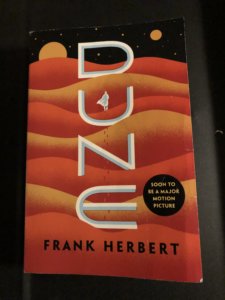
For educators: This post is appropriate for teens who have read Dune and might want to to improve their storytelling/writing skills.
I happen to be in a writing critique group that started up this past week. A couple of the folks in this group are writing novels and sent in first chapters for a swipe at getting feedback. So, I read a few first chapters yesterday and in the course of my reading, I began to wonder…Do these seem like first chapters to me? How do I feel as a reader as I am taking in the narrative for the first time? Do I begin to have a strong sense about the story, the characters and about the writing style? Absolutely. I did and do have feelings and ideas. Some of those made me want to keep reading. Others did not.
That led me to the question: How does a novelist write a brilliant chapter one that makes you want to keep reading?
I wonder about my own first chapter, the beginning of my novel that is undergoing an extensive edit. What is it accomplishing and what is it not accomplishing? Have I done the necessary work to hook my reader, keep them interested and engaged, settle them into the world I am creating?
All writers of any genre ponder this question when they sit down before the blank page because the possibilities are endless, as endless as stories themselves. However, I do think there are ways to understand first chapters, to critique and edit them for the purpose of making them better.
Therefore, I begin a series of posts devoted to the question of beginnings. My focus will be on science fiction and fantasy novels and the hope is not to be prescriptive. Telling the writer what to do or not do detracts from originality and art. However, paying attention to how great authors craft a narrative is worthwhile. We learn from the greats. Study enough greats and we begin to see common threads.
So, my goal in this series of posts is to plunder first chapters and see what I can glean about my own writing and will record my findings for the sake of other writers.
 A Look at DUNE, Chapter 1
A Look at DUNE, Chapter 1
Frank Herbert is a great writer and though the novel DUNE isn’t perfect, it’s very close to perfect. How does that first chapter set us up for a marvelous journey?
I see it accomplishing four things.
Chapter 1…
-Gives us a sense of the setting in which the story will take place
-Introduces the primary characters, even putting the main character through a first test
-Hints at the coming conflict
-Tantalizes the reader with compelling mysteries that make you want to keep reading
Chapter 1 of DUNE give us a sense of the setting.
Here is the first sentence of the novel.
In the week before the departure to Arrakis, when all the final scurrying about had reached a nearly unbearable frenzy, an old crone came to visit the mother of the boy, Paul.
Most of us have experienced moving houses, cities, states. We know what it feels like to change locations. In this first sentence of DUNE, the reader is alerted immediately to the fact that a change in location is taking place for this particular family, for this particular person, Paul. Moving is disruption. Paul’s family is about to be disrupted. He will soon be leaving Caladan for a planet called Arrakis, sometimes called Dune.
Soon after, in the early paragraphs, Herbert repeats this series of words three times as paragraphs. They jump out on the page like a refrain. They are written in italics, which in Herbert’s style, represents thought. Paul, the main character continues to mull over this reality.
Arrakis—Dune—Desert Planet
So, not only will Paul be leaving his current location, but the new location is harsh. There is a sense of foreboding about this desert planet. Paul will move from Caladan, a land where water is plentiful to Arrakis, where water is scarce. Caladan is known, comfortable, secure, a virtual paradise. Arrakis is mysterious, uncomfortable in so many ways, in part because of its climate. Climate will be a large issue in the rest of the novel. Herbert wants the reader to begin thinking about ecology and its importance to a planet and a people.
Here is the second sentence of DUNE.
It was a warm night at Castle Caladan, and the ancient pile of stone that had served the Atreides family as home for twenty-six generations bore that cooled-sweat feeling it acquired before a change in the weather.
When Paul’s family leaves Caladan, they are not only leaving their current comfortable home/castle, but they are leaving their home of twenty-six generations. This move is an epic move. The reader is left asking…why? Why leave this lovely planet and this home of so many years? We get a few clues as to why this move it taking place. Power and political maneuvering are introduced, a profound subject of the story.
Thufir Hawat, his father’s Master of Assassins, had explained it: their mortal enemies, the Harkonnens, had been on Arrakis eighty years, holding the planet in quasi-fief under a CHOAM Company contract to mine the geriatric spice, mélange. Now the Harkonnens were leaving to be replaced by the House of Atreides in fief-complete—an apparent victory for the Duke Leto. Yet, Hawat had said, their appearance contained the deadliest peril, for the Duke Leto was popular among the Great Houses of the Landsraad.
Arrakis is the place where the empire derives its most important resource: Melange, or spice, as it is sometimes called. Melange is the secret to space travel in this particular universe.
We can already see now how the chess pieces are stacking up, a sense of the conflict.
This brings us to the second accomplishment of Herbert’s chapter one, the introduction of most of the main characters.
Paul is mentioned in the first sentence. So is his mother. Paul’s mother and Paul are on the stage for the very final scene of the novel as well. In fact, his mother gives voice to the final paragraph/speech.
Not only that, but the crone mentioned in that first sentence, the one who will test Paul later in the chapter, will also be on that stage at the finale. This is great writing.
Add to the list the Bene Gesserit, the Fremen, House Harkonnen…all are mentioned, Thufir Hawat, (who will be present in the final scene) and Dr. Yueh, important as the one who betrays House Atreides…all are introduced in chapter 1.
Note this paragraph early in the chapter.
Paul awoke to feel himself in the warmth of his bed—thinking…thinking. This world of Castle Caladan, without play or companions his own age, perhaps did not deserve sadness in farewell. Dr. Yueh, his teacher, had hinted that the faufreluches class system was not rigidly guarded on Arrakis. The planet sheltered people who lived at the desert edge without caid or bashar to command them: will-o’-the-sand people called Fremen, marked down on no census of the Imperial Regate.
The Fremen will become important to the story, of primary importance, but the reader is simply introduced here. There is mystery surrounding these people. I am curious. I want to learn more and Herbert will plunge me into Fremen culture before too long.
It’s interesting to note who is left out of chapter 1.

Chapter 1 hints also at future conflict.
As Paul is undergoing the test, the gom jabbar, here is what the Reverend Mother, the crone says to him.
The old woman said: “You’ve heard of animals chewing off a leg to escape a trap? There’s an animal kind of trick. A human would remain in the trap, endure the pain, feigning death that he might kill the trapper and remove a threat to his kind.”
As I was re-reading the chapter last night, this nugget stopped me in my tracks. I had not realized, not seen how this Reverend mother quote foretells the remainder of the story.
Paul does feign death on Arrakis, so that he might kill the trapper and remove the threat to his family. That is, in essence, a summary of the novel. These two sentences are so brilliantly placed, subtle in all the best ways. We don’t understand consciously upon first reading, but Herbert has just told us what we can expect.
Lastly, chapter 1 teases the reader with mysteries.
This is an odd world, a mysterious one in which a mother of an only son, will give him up to a religious figure, knowing he might die.
Jessica stepped into the room, closed the door and stood with her back to it. My son lives, she thought. My son lives and is…human. I knew he was…but…he lives. Now, I can go on living.
This we absorb and I, at least, want to read to find out more about this bizarre world where such a thing would happen. In order to know more, I must keep reading.
Then, there is the planet Arrakis and the Fremen. In chapter one, we learn very little about them, but we wonder about them as Paul does. The planet is a desert and the Fremen seem to live off the grid. They are wild and uncounted by the empire. Who are they? We are meant to wonder, and to find out, I have to keep reading.
And lastly, in Chapter 1, Herbert introduces the reader to the idea of the Kwisatz Haderach, a messianic figure. Is Paul the Messiah? The reader suspects he is, though Paul himself struggles with this identity throughout the novel, mysterious even to him. We will have to keep reading if we want to figure out the true identity of the Kwisatz Haderach.
So…all of this in Chapter 1. I am wowed and I am hooked. I am also set up well in the world to take in more of the details as they unfold. Moreover, I have enough sense of the main characters to be able to navigate this complex world where many more characters will soon be introduced. It makes me wonder how many times Herbert went back to edit and perfect his beginning…because I don’t think he could have written a better version than the one we read today.
So, You Just Finished Writing a 70K Word Sci-Fi Novel…Advice to the Young Writer

So, I had the phone conversation with a young man (son of an old friend) yesterday. I decided to write him a follow up email with a few resources I have appreciated and it made sense to put it into a post. Next time, I can just send the link. Actually…I wouldn’t do that. I would still take the phone call, but it helps to have the information written down in one place.
For the new writer…Here’s my advice:
First, congratulate yourself that you just wrote a novel. That.Is.Amazing. Celebrate and then think like a critic and move on. Try to figure out if this book is what you really want to publish and to the best of your ability, think about whether or not you’re addicted to writing. If you’re not, the road is too hard and very long (for most of us). Don’t keep going unless you know you really LOVE it.
Social Media. You might hate it, but every author has to be on social media. If you want to start somewhere, try Twitter.
On Twitter, connect with and start following folks from the #WritingCommunity. Other hashtags you could check out: #amwritingsciencefiction, #amwritingspeculativefiction, #amwriting, #amwritingfiction. While you’re there you’ll find links to various author websites. Some are way more amazing than mine, others are just a page with a photo and the book cover, with minimal links if any. Begin thinking about your author website. How do you want it to feel? What content, if any, do you want to regularly produce on it?
Find a Critique Group:
It’s great to have beta readers, but it’s even better to find a group of writers, like-minded souls who write and will be willing to read your stuff and give you feedback. I’ve started a number of groups over the years. What I have found is that the most important trait for those in the group is work ethic. If the people aren’t actually writing, then it’s probably not worth your time because A. they won’t submit anything to the group and B. They will be the weakest when it comes to critique. Find people who write and be willing to put in the work for them by being a thorough and honest critic. Work for them and they will work for you. (That’s ideal…always exceptions, but be careful about those exceptions).
Go to Cons (like Emerald City Comic Con or WisCon) and get to know people. You will meet fans and you will meet writers and small publishers. You will make connections and you will have fun. (Photo of Ariel is my daughter, who goes to Cons and always dresses up, mostly not in Disney costumes, but this was the best photo I could find today…plus, it’s bright and cute.)
Books on writing and why I like them:
Story: Structure, Substance, Style and the Principles of Screenwriting by Robert McKee
If you buy one book, I would make it this one. I’ve taken McKee’s class twice (weekend course) and everyone from Pixar would attend in the Bay Area (where I used to live). Screenwriters would fly up from LA to take it in case they had missed the weekend in Southern California. I knew writers who would take it every other year during the time he was touring. He traveled all over the world teaching his course in the 90s and early 2000s. Why? I think he had/has a way of distilling what it takes to tell a great story. It’s less literary and more about structure, the architecture of good storytelling. I refer to this book all the time, also because this was the stuff I never learned in college. For whatever reason, my writing program de-emphasized story structure. Maybe they thought we were smart enough to pick it up, sniff it out and do it ourselves.
*Why don’t I have a photo of this book cover? I have loaned it out…which so many of us writers inevitably do and then regret. That book has escaped my shelves. I have no idea who has it now, so I will probably have to buy it again. DRAT! It’s not cheap!
Steering the Craft by Ursula K. le Guin

le Guin has written a wonderful series, 5 fantasy books (long before Harry Potter) about a wizarding school, called
If you don’t want to buy all five, try out the first one.
UK le Guin is one of my heroes. Here is my review of her science fiction book, THE LEFT HAND OF DARKNESS, A Book Review
The ART of Character by David Corbett
This book (pictured on the top of post) drives home the kinds of techniques that make characters eternal/memorable. It too is practical. The chapter on Protagonist Problems is spot on and one of the best things you can read as a young writer. Corbett captures key mistakes many writers make when crafting characters, especially main characters.
Revising Fiction, by David Madden
A CANTICLE FOR LEIBOWITZ, by Walter M. Miller Jr., A No Spoiler Review
This morning, I finished reading the classic science fiction novel, A CANTICLE FOR LEIBOWITZ. I rate this novel PG for violence.
First, the short review…
To purchase the novel, click A CANTICLE FOR LEIBOWITZ.
5 Reasons I Recommend A CANTICLE FOR LEIBOWITZ
- If you are a science fiction fan and want to be fluent in the genre’s history, Leibowitz is on many lists of must read sci-fi.
- The novel’s world is depicted plainly and purposefully, capturing the tragedy of a post nuclear holocaust world without sentimentality. The prose is often lovely and the story becomes more and more gripping as it unfolds.
- Especially for the philosopher and the theologian, A CANTICLE FOR LEIBOWITZ puts forward some of the most profound ideas around human evil and our propensity for self-destruction.
- Even if you’re not a philosopher, the characters and ideas come together in a way that does not allow the reader to ignore our society’s seeming dance toward self-destruction.
- In a similar vein as On The Beach, by Nevil Shute, A CANTICLE FOR LEIBOWITZ is a story that has the capacity to change our minds about nuclear arms and warfare.
Longer Review
A CANTICLE FOR LEIBOWITZ was originally published in three parts.
Fiat Homo…Let there be man
Fiat Lux…Let there be light
Fiat Voluntas Tua…Let thy will be done
The first two section titles refer to the Biblical account of creation, when God spoke the earth and humankind into being. The third section’s title refers to the Christian New Testament. Not that the idea lacks foundation in the Hebrew Bible, but the phrase itself is taken from The Lord’s Prayer and Jesus’ prayer in Gethsemane before his death. “And he went forward a little, and fell on his face, and prayed, saying, My Father, if it be possible, let this cup pass away from me: nevertheless, not as I will, but as thou wilt.”
A fair amount of Latin is spoken in this novel and I did not understand all of it, but most phrases are translated within the story or the context makes the meaning clear. All of the main characters and narrators are associated with a religious order, the monks of The Leibowitzian Order, that was established following what the novel calls The Flame Deluge.
The monks, much like Irish monks during the Dark Ages, copy, preserve and make available ancient knowledge to those who will have it. For the most part, the barbarians who dwell around the monastic fortress, whose setting is the old American West, hate this knowledge and see it as the reason destruction came to the planet.
An excerpt from the novel:
“After the bombs and the Fallout came the plagues and the madness. Then, in the bloodletting known as the Age of Simplification, the people – those few who remained – rose up against their teachers, their scientists and their rulers, those they held responsible for turning the world into a barren desert…”
A CANTICLE FOR LEIBOWITZ, published in 1959, channels the zeitgeist of an era when people were genuinely terrified of and preparing for nuclear war. For many readers, especially, younger readers, that period of history can feel like a long time ago in a galaxy far far away…but given Covid19, the economic shock that has hit the globe through the shutdown as well as the rise of a belligerent Communist China and a perpetually divided United States, war and/or chaotic one-upsmanship between two superpowers seems less far distant than it has since 1989, when the Soviet Empire collapsed. If World War III were to happen today, what would be the fallout?
Many of the questions posed by Miller in A CANTICLE FOR LEIBOWITZ are relevant today. There is wisdom and a degree of sobriety that can be gained by our society paying closer attention to stories like this one.






